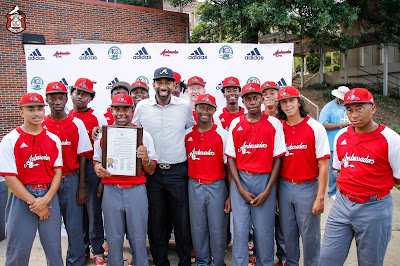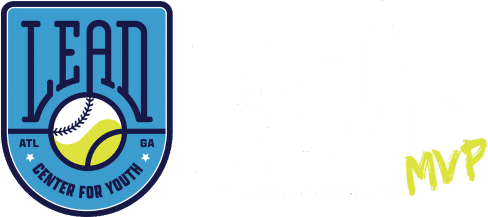 |
| L.E.A.D. Ambassdor Ja’Vien Woods and U.S. Senator Johnny Isakson |
ATHLETICISM & ACTION. How YOU Make Things Happen.
by C.J. Stewart
 |
| L.E.A.D. Ambassdor Ja’Vien Woods and U.S. Senator Johnny Isakson |
ATHLETICISM & ACTION. How YOU Make Things Happen.
by C.J. Stewart
 |
| Officer J.T. Somers and DeAngelo Nowell, Jr. |
 |
| L.E.A.D. Ambassadors with Atlanta City Councilman Andre Dickens |
by C.J. Stewart
This was the Facebook post that my wife Kelli made on Monday, May 14, 2018. To my surprise, nobody responded negatively.
“When Black people are told to be humble, it means we have to surrender our confidence and dignity. It is an age-old strategy that is akin to using Christianity as a tool to justify American slavery.
It’s what got Emmett Till murdered and our ancestors lynched – the notion that we would have the nerve to express our confidence and dignity.
There is a common thread between our explicitly tragic history and the calls we hear today to be humble: they are all based on acts of suppression that, cumulatively, amount to a culture of oppression. They all originate from a deficient and sometimes unconscious belief in a hierarchy of sorts, one in which we are all somehow supposed to “know our place.”
If I have been diligent in my craft and have experienced success as a result of it- I have earned the right to be confident. #LettinMyLightShine #ClaimingMyGreatness #NotHidingItUnderABushel #iSeeWhatYouTryinToDo
| Kelli Stewart |
According to Rick Warren, “True humility is not thinking less of yourself; it is thinking of yourself less.”
I really like that definition.
As a child and even up until age 40, I defined humility as hiding my blessings and not taking credit for positive things that I’ve done so that I wouldn’t make others feel “unsafe”.
At age 40, I graduated from Leadership Atlanta’s 2015 cohort class. The mission of Leadership Atlanta is to build a better community for everyone in the Atlanta region through education about the key issues facing the region and inspiring members and others to take on and exercise real leadership committed to serving the common good.
Leadership Atlanta was a convicting experience that enabled me to get better connected with myself, which allowed me to collaborate with others to create change.
At age 40, I gave myself permission to embrace my blessings from God that allow me to bless others on earth. I also stopped the deflection of credit when I accomplished things. Ultimately, I realized that I serve as a conduit to receive blessings from God that I can then give to others.
For me, there are few things worse than an obscure Black man. As a child, I assumed that everything that was done right was done by a White man.
As children, we all form our sense of self-worth based on the circumstances and messages thrust upon us, but that doesn’t mean they are true. Our journey is one of navigating reality and overcoming untruths – of recognizing what is false in the world around us and what is true in ourselves.
Along that journey, there is balance and unity that comes with humility – a recognition that we may be much better than we thought we were as a child, but we are still imperfect individuals in an imperfect world.
As an imperfect man of God, I’m on assignment every day. We all have a purpose for our life and mine is to be significant by serving millions and bringing them into a relationship with Christ starting with my wife, Kelli, and our daughters Mackenzi and Mackenna.
| Mackenna and Mackenzi Stewart |
Ending racism in my lifetime is number 1 on my list.
Why is ending Racism #1? Because when I call on my own humility, what I want is about so much more than what I want. Ending racism is a legacy that will generate a positive impact that will flow powerfully through time and space, to future generations and to all people (not just black people). It will help us “know our place” relative to God rather than relative to each other.
This is not about me thinking less about myself, it is about me thinking of myself less.
I’m a devoted husband and father, a consequential leader, a coach, and a Best Selling author among many blessings. I have been diligent in my craft and have experienced success as a result of it- I have earned the right to be confident.
– How does Kelli’s Facebook post make you feel?
– How do you define humility?
– What emotions do you feel in the presence of a confident Black man?
by C.J. Stewart
The feeling of acknowledgement is important to some people. It shows they are not being ignored or lack value.
Even the Bible says it’s alright to be angry, but not to sin:
“Be angry and do not sin; do not let the sun go down on your anger, and give no opportunity to the devil.” — Ephesians 4:26-27 ESV
As a Black man, I oftentimes get mad because I don’t feel I get the same treatment than my White male counterparts, especially when I’m trying to make things happen in Atlanta.
In my dealings with other people, I seek three things: benefit of the doubt, respect and trust.
No. 1 — Benefit of the doubt
We all stereotype each other. I believe that it’s impossible to stop and is healthy to do.
It scares people at times, but early on in conversations with people, I share the stereotypes that I have of them so that they can debunk them immediately. This helps us connect, which leads to respect.
While I’m not a mind reader, my spiritual gift is discernment. I can feel when people doubt me. If you don’t have the courage to tell me the stereotype you have of me, give me the benefit of the doubt so that I can earn your respect.
No. 2 — Respect
Respect is the ability to treat people in a positive manner—a way that acknowledges them for who they are and/or what they are doing.
An important part of respect is simply acknowledging the other person in a positive manner. You don’t have to like me when you first meet me, but you should respect me until I’ve given you a reason not to.
No. 3 — Trust
Trust is the confident expectation of something; hope.
Things getting done move at the speed of trust. For some, trust takes time, which usually translates into a lot of time. For me, trust moves at the speed of your willingness and ability to make and keep promises.
Making and keeping promises means that I deem you as important. It means I will trust you.
Finding out what you deem important is about asking what’s valuable to you.
As a Black leader in Atlanta, I want the benefit of the doubt, respect and trust, in that order. Having all three enables me to deliver on promises that I make to hundreds of young Black men every year.
Under my leadership and the support of our L.E.A.D. staff and executive board of directors, our L.E.A.D. Impact Stats are as follows:
These are numbers that we are proud to share. They represent the hallmarks of our success and represent the foundation for efforts to help build the next generation of Black leaders.
by C.J. Stewart
To me, “There’s no Silver Bullet” is code for …
My temperature rises when I’m in the room with “leaders” and “problem solvers” and we get to the point when somebody says, “there’s no Silver Bullet”. What are they really saying?
When I hear that, I immediately think of three things.
1. The person saying it understands the problem but doesn’t know how to solve it.
2. They don’t understand the problem and don’t care to solve it.
3. They simply don’t care to solve the problem.
What is impeding the solution?
What if it is true that all problems are created by people and all problems start out simplistically.
Simplistic statements are typically overstated, shallow and trite. They serve the speaker and can foster avoidance and lack of responsibility. Statements such as, “hard work beats talent when talent works hard”. When put to the test, fails 50% of the time. Why? One reason it is doesn’t account for when we work hard at the wrong thing.
When solutions are simple, things get done. However, don’t confuse “simple” with “easy”. The real Silver Bullet is the “simple thing”. When solutions become simple, folks are now responsible for taking action which exposes their will. Folks that don’t really want to do the work to create change, strive for and hope to maintain convolution.
I live by six Core Values that help me not succumb to the trite statement, “hard work beats talent when talent works hard”.
The 6-Core Values are …
1. Excellence is setting and meeting expectations.
2. Humility is thinking of others more than yourself without thinking less of yourself.
3. Integrity is doing the right thing even when you can do the wrong thing.
4. Loyalty is doing the right thing even when it is unpopular.
5. Stewardship is protection of values, beliefs and people.
6. And finally, teamwork, being your best within a group of people that are being their best for a specific purpose.
The airplane was a Silver Bullet for transportation. The internet, the Silver Bullet for information. How about the telephone? A Silver Bullet for communication. What problems do you see today? Acknowledge the answer may be simple and require us to deal with our will to act.
I’m the CEO and co-founder of L.E.A.D. (Launch, Expose, Advise, Direct) and we use baseball as a vehicle to empower an at-risk generation to lead and transform their city of Atlanta. We empower our Ambassadors to fight against crime, racism and poverty.
The nay-sayers and cynics respond to this by saying that there is no bullet for fighting crime, racism and poverty and my response is simply, L.E.A.D.
| Photo by Jason Getz |


© Copyright L.E.A.D. 2024 All Rights Reserved. Powered By Diamond Directors Inc.